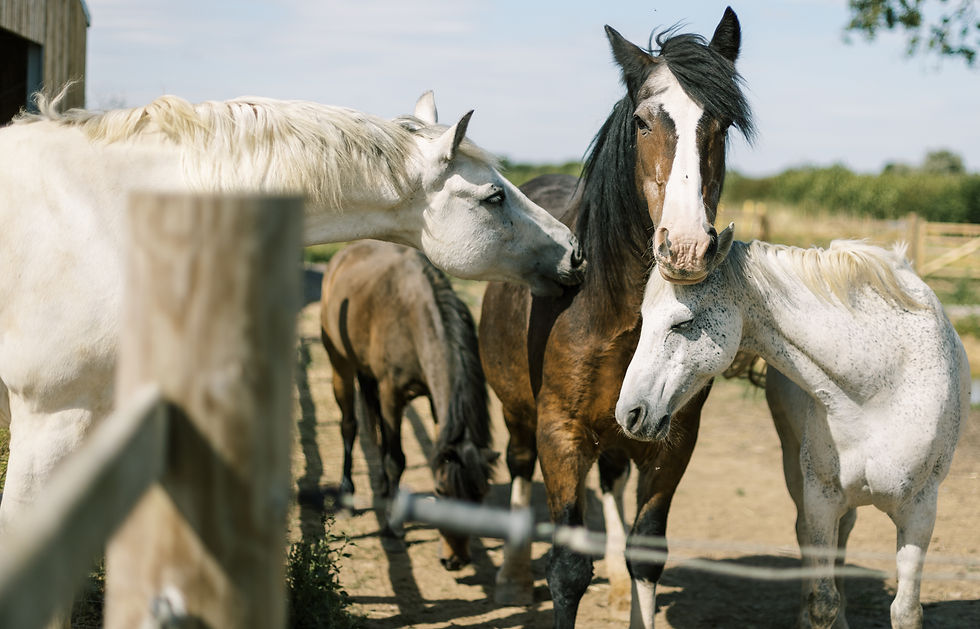Does Equine Therapy Really Work? Exploring the Evidence
- Nina Leijerstam
- Oct 15, 2025
- 3 min read
Many people wonder if equine therapy truly creates change or if it’s just a pleasant experience. At Track Clinic, the difference lies not only in what we do, but how we do it. And the outcomes speak for themselves.

Horses as Co-Regulators, Not Tools
At Track Clinic, our herd live in a way that allows their natural regulatory abilities to stay fully intact. They roam freely together on pasture as a cohesive social group, forming deep and secure bonds with one another.
Because they are not ridden or used for tasks, they are never placed in a performance mindset. They are free to choose whether to approach, stay close, or walk away; offering authentic, moment-by-moment feedback to those in their presence.
This living environment is central. It means the horses come into sessions emotionally balanced, socially attuned, and available to co-regulate. Clients experience not just contact with an animal, but being genuinely met and responded to by another living being.
Skilled Support, Not Direction
Each session is supported by two facilitators: a licensed mental health professional and a trained equine specialist. Their role is not to direct the experience or interpret the horses, but to hold emotional and physical safety while leaving space for genuine connection to unfold.
This structure allows the horses to set the therapeutic pace, while ensuring clients feel supported and safe enough to explore what arises.

Measurable Impact: SDQ Outcomes
This approach is not just felt, it is measured. Clients complete the Strengths and Difficulties Questionnaire (SDQ), a widely used mental health screening tool, before starting and after 12 sessions.
Here is a typical outcome from one young person who attended our programme:
SDQ Scale | Pre Treatment | Post Treatment | Change |
Overall difficulties | Very high | Close to average | ➕ |
Emotional problems | Very high | Close to average | ➕ |
Conduct problems | Close to average | Close to average | ➕ |
Hyperactivity problems | Slightly raised | Close to average | ➕ |
Peer relationship problems | Very high | Close to average | ➕ |
Kind & helpful behaviour | Slightly low | Close to average | ➕ |
Impact of difficulties on life | High | Close to average | ➕ |
Many people show similar patterns: a shift from high/very high difficulties to close to average across emotional, behavioural and social domains, often in just 6–12 sessions, and sometimes over a longer period depending on their circumstances.
Why It Works
The success of our programmes does not come from “activities with horses”, it comes from how the horses are allowed to be, and the safety created around them.
Horses who are emotionally healthy, socially secure and free to choose can offer authentic co-regulation
A choice-based, non-riding model lets horses respond honestly to people, which creates powerful feedback moments
Facilitators hold the container, rather than directing it, so that genuine relational repair can emerge organically
When people are met in this way, they often begin to settle their nervous systems, regulate their emotions, and reconnect with others, shifts that are clearly reflected in their SDQ scores.
A Growing Body of Research
Track Clinic’s results sit within a much wider field of research. Over the last two decades, dozens of studies and meta-analyses have shown consistent benefits from equine-assisted interventions across many groups, including children with anxiety, young people with social and emotional challenges, and adults recovering from trauma or PTSD.
Findings include:
Reduced anxiety, depression and PTSD symptoms
Improved emotional regulation, social skills and peer relationships
Positive physiological changes such as lower cortisol, higher oxytocin and improved heart-rate variability
Although more large-scale controlled trials are still needed, the evidence base strongly supports equine therapy as an effective and impactful approach when practised ethically, with high horse welfare and attuned facilitation. Read the studies

Have More Questions?
If you're wondering whether equine therapy is right for you or your child, read 5 Signs Equine Therapy May Help. And feel free to get in touch here with any questions. You can also explore more about this work — from research and client stories to videos of the herd in action — on our Learn More page.
Track Clinic is based in Frome, Somerset, within easy reach of Bristol, Bath, Glastonbury, Salisbury, Yeovil, Trowbridge and Chippenham. We also welcome clients travelling from across the UK and internationally to attend programmes at our equine therapy centre.


